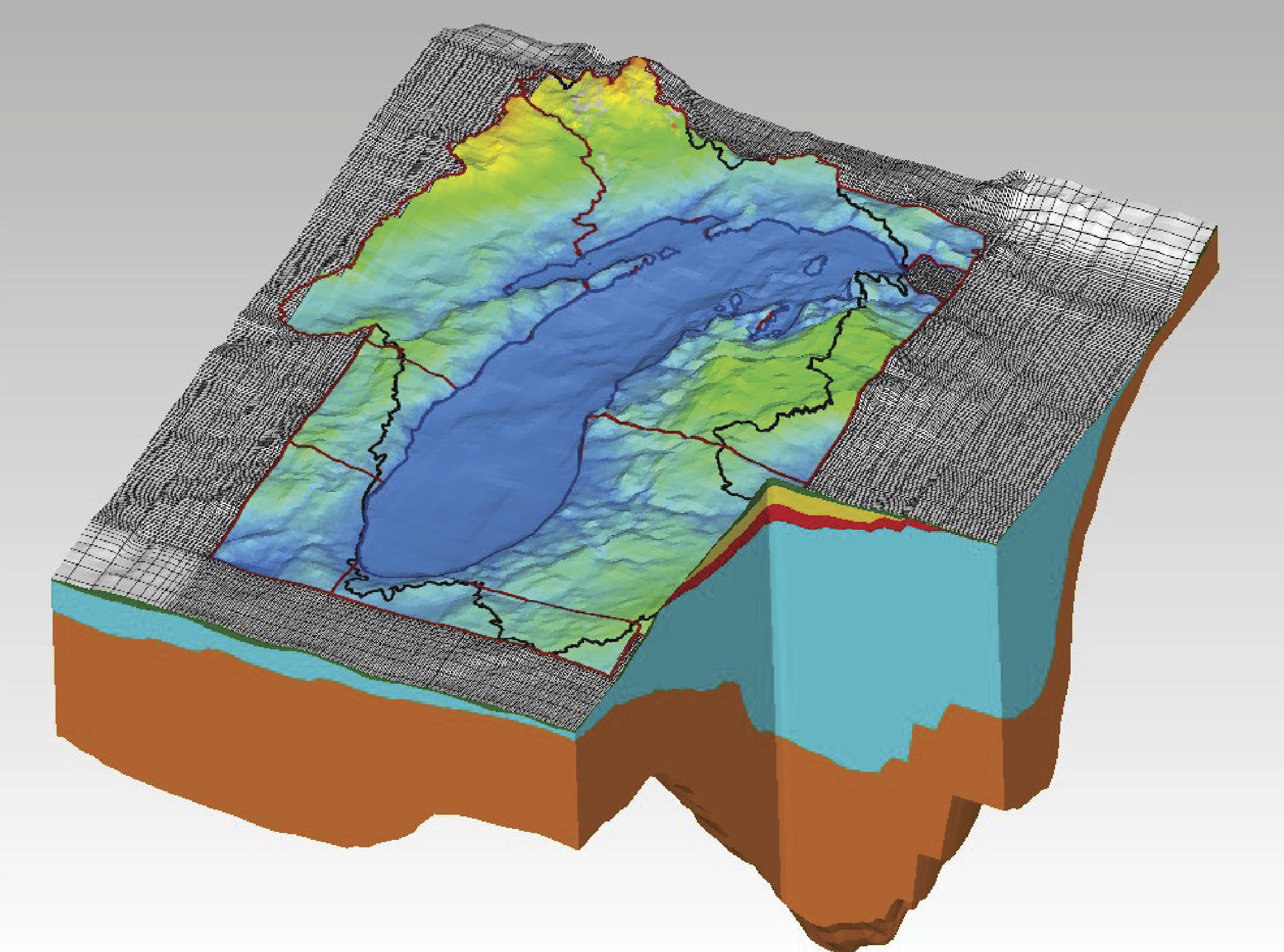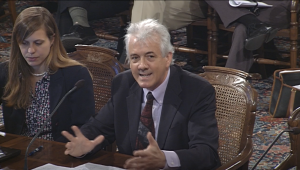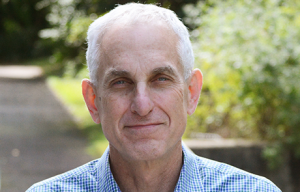
Missed 2006 water law opportunity enabled Nestle approval in 2018
In 2006 the Michigan House of Representatives passed a landmark law that regulated groundwater withdrawals, including a provision for the Public Trust Doctrine. But the bill was defeated in the Senate by a single vote.
Had the Public Trust Doctrine become part of the law, some experts believe it could have served as the basis to deny Nestle’s recent request for additional water for its bottled water operation.
In general, the Public Trust Doctrine says a natural resource like water is held in “trust” by the state for its citizens and the state must prioritize the interest of the public over that of private entities.
The doctrine can serve as a legal basis for citizens to sue when they believe the state is not managing the resource in the best interests of the public.
Without the Public Trust hurdle, a high bar, Nestle only had to convince Michigan’s Department of Environmental Quality (MDEQ) that its water request would not show an adverse Impact, a lower barrier.
The MDEQ approved Nestle’s request saying it was following the law.
Public comments were overwhelmingly against allowing Nestle to take more water.
“Overarching limitation”

Jim Olson, Founder & President, Photo by flowforwater.org
Traverse City water attorney James Olson told Great Lakes Now that the presence of the Public Trust Doctrine “may not have prevented issuance of the (Nestle) permit, but it would impose an overarching limitation on the exercise of government power to transfer or allow diversion and sale of the public trust waters of the state.”
Olson said it’s important “because a state cannot exceed public trust or ignore it.” He said it also serves as a basis to repeal a permit if a mistake was made.
Olson successfully sued Nestle on behalf of Michigan Citizens for Water Conservation in 2001 and the judge ordered Nestle to stop pumping. Nestle appealed and negotiated a settlement in 2009 that limited how much water Nestle could take.
Great Lakes Compact requirement
With passage of the Great Lakes Compact looming that could require states to regulate water withdrawals, Michigan began the legislative process of regulating its ground water in 2006.
Water advocate Cyndi Roper told Great Lakes Now “by statutorily placing groundwater in the public trust, lawmakers could have given the state a separate legislative standard by which to say yes or no to a water withdrawal permit.”
With the doctrine codified in the water law “the state would have to make a determination of whether or not the permit was in the public interest if this statute had been enacted,” according to Roper.
Roper was the Michigan Director for Clean Water Action at the time.
But Michigan’s environmental advocates pushing the legislature to act were not in agreement on the importance of the Public Trust Doctrine.

Sarah Mullkoff and James Clift testify before 2015 House Energy Policy Committee, Photo by house.mi.gov
James Clift told Great Lakes Now that he recognized the potential of the Public Trust Doctrine, but he was more focused on getting a law passed to limit water withdrawals.
“It is important to remember that prior to passage of this law, Nestle would not have been required to get any state permit to withdraw water from a groundwater aquifer,” he said.
Clift is a Policy Director for the Michigan Environmental Council and previously worked on environmental issues in the Michigan senate.
He said that it is “unclear” if previously enacted in Michigan law that the Public Trust Doctrine could have changed the recent Nestle decision.
“The MDEQ would argue that it has put monitoring requirements in place to ensure that Nestle does not have an unreasonable impact on the local water resources. If impacts exceed certain specific levels, Nestle is required to reduce pumping from the aquifer. It would be up to a court to decide whether those restrictions would be adequate to protect the public interest in groundwater,” Clift told Great Lakes Now.
Low priority
During the period when Michigan was debating its water withdrawal law, the bottled water issue was not a priority for the big Great Lakes groups like the National Wildlife Federation (NWF) with a Great Lakes office in Ann Arbor, and the Chicago-based Alliance for the Great Lakes with a Michigan office.
Their leaders, Andy Buchsbaum at NWF and Cameron Davis at the Alliance, were influential in all policy issues related to water and the Great Lakes.
But they were focused on passage of the Great Lakes Compact which included a provision that allowed water in containers less than 5.7 gallons to leave the region. It is widely known as the bottled water loophole the Washington Post reported in 2008.

Andy Buchsbaum Vice President, One Federation
Great Lakes Regional Center, Photo by nwf.org
Buchsbaum acknowledged the need for “more protections against bottled water exports,” but was quoted that, “it’s not the biggest threat to the Great Lakes,” in author Dave Dempsey’s book Great Lakes for Sale.
On the compact, Davis said in 2008, “It doesn’t create a loophole. It simply gives states the ability to manage water the way they see fit. If a state wants to ban bottled water, they can do that … There aren’t enough bottles in the world to send out water in the quantities we’d worry about.”
From a regional advocacy level, the message was sent that withdrawals for bottled water weren’t an issue.
Where to from here?
Public comments on the recent Nestle request to take more water were 80,945 against and 75 for, a staggering gap that’s hard to ignore no matter what the law says.
And the Nestle bottled water issue doesn’t exist in a vacuum for Michigan.
The state is surrounded by water but its stewardship of it still tainted by the Flint water crisis. And Michigan has been slow to react to the threat of an Enbridge oil pipeline leak in the Straits of Mackinac which further questions its prioritization of water and commerce when the two collide.
The aged pipeline hit the spotlight in 2013 and there is no resolution of its status five years later.
Following the exclusion of the Public Trust Doctrine from the water withdrawal law, advocates said they would regroup to fight for it but that never happened. Roper said “the environmental community was torn apart by this.”
“Lack of oversight” and “outrageous problem”
Great Lakes Now went back to Clift and Roper and asked if is time for Michigan to revisit the Public Trust Doctrine as a tool to strengthen protection of water?
Clift did not address the doctrine in his response instead focusing on deficiencies in Michigan’s existing law.
He said Michigan’s Water Use Advisory Council has made over 60 recommendations to improve water withdrawal legislation but “only a handful of those recommendation have been acted upon.”
“History is littered with fresh water resources that have been destroyed or diminished due to a lack of oversight – Michigan must remain vigilant to ensure the Great Lakes remain a viable and healthy resource for generations to come,” says Clift.
Roper told Great Lakes Now that “in the wake of the latest Nestle decision, there is a renewed interest in correcting this outrageous problem. Some initial proposals and conversations are underway.”
Roper is now with the Natural Resources Defense Council and she referred Great Lakes Now to James Olson at FLOW for more information.
A FLOW spokesperson told Great Lakes Now that it is discussing options with other groups following the Nestle decision but declined to provide specifics.
Michigan state Senator Rebekah Warren from Ann Arbor previously told Great Lakes Now after the Nestle decision that she was “considering appropriate legislative responses to the recent permit decision.”
Her office did not respond to a request to comment on the Public Trust Doctrine. Warren is Democratic Vice Chair of the Senate Natural Resources Committee and was involved in passage of Michigan’s water withdrawal law as a member of the House.
The Department of Environmental Quality did not respond to a request to comment.
For more on Nestle and water diversions see the Great Lakes Bureau’s documentary, Tapping the Great Lakes.
——————–
(Editor’s note: Former state Senator Patty Birkholz (R-Saugatuck) was instrumental in moving Michigan’s water laws forward and in securing approval of the Great Lakes Compact. Birkholz passed away last week. She was 74.)




